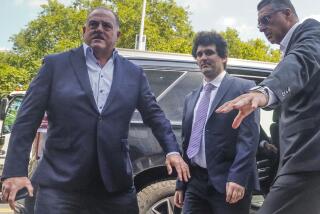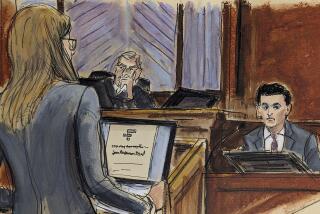Prosecutor Sums Up Tyco Case
- Share via
NEW YORK — A prosecutor Thursday described as “despicable” the testimony of L. Dennis Kozlowski, Tyco International Ltd.’s former chief executive, when he said a now-deceased Tyco director had approved bonuses Kozlowski is accused of stealing.
Kozlowski and Mark Swartz, Tyco’s former finance chief, paid themselves more than $100 million in unauthorized bonuses in 1999 and 2000, prosecutors say.
Kozlowski testified that Tyco director Philip Hampton, who died in 2001, knew about the payments. Swartz testified that Kozlowski told him the same thing.
“These two defendants are shielding their thefts with Philip Hampton,” prosecutor Ann Donnelly told a New York state court jury in her summation. “That is despicable.”
Five former Tyco directors testified that Hampton never mentioned the 1999 and 2000 bonuses and was unlikely to act alone. That left the defendants’ statements about Hampton as the most specific rebuttal to the allegation that the board was kept in the dark.
The five former directors were all on the compensation committee with Hampton. None of the payments appear in documents presented to or prepared by the Tyco board’s compensation committee, prosecutors say.
“Your consideration of these defendants should be informed by this ridiculous, desperate claim,” Donnelly told the jury.
The government charges that Kozlowski, 58, and Swartz, 44, in addition to taking bonuses without the approval of Tyco’s directors, also abused company loan programs and misrepresented Tyco’s financial condition to investors while selling more than $575 million in shares and options.
The defense says that the payments were correctly recorded in Tyco internal records and that they were due the defendants under the company’s compensation formula. Kozlowski and Swartz testified that they made no attempt to hide their actions from auditors or the board and made all necessary representations to investors.
Swartz and Kozlowski face 31 counts of stock fraud, falsifying business records, grand larceny and conspiracy. The most serious charge carries a 25-year prison term.
The trial, which began Jan. 18, included a 13-week prosecution case with 24 witnesses and thousands of documents presented as evidence. The defendants are being tried for the second time. The first case ended in a mistrial in April 2004.
More to Read
Inside the business of entertainment
The Wide Shot brings you news, analysis and insights on everything from streaming wars to production — and what it all means for the future.
You may occasionally receive promotional content from the Los Angeles Times.










